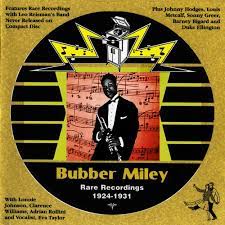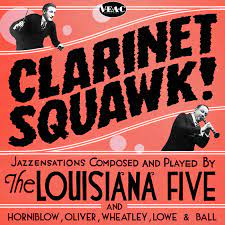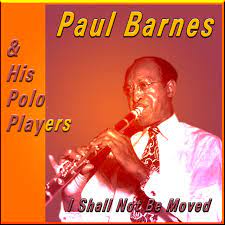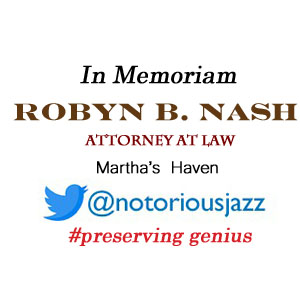
Daily Dose Of Jazz…
James Wesley “Bubber” Miley was born April 3, 1903 in Aiken, South Carolina into a musical family. At the age of six, he and his family moved to New York City, New York where, as a child, he occasionally sang for money on the streets, and later, at the age of 14, studied the trombone and cornet.
In 1920, after having served in the Navy for 18 months, he joined a jazz formation named the Carolina Five, and remained a member for the next three years, playing small clubs and boat rides all around New York City. After leaving the band at the age of 19, Miley briefly toured the Southern States with a show titled The Sunny South, and then joined Mamie Smith’s Jazz Hounds, replacing trumpeter Johnny Dunn. They regularly performed in clubs around New York City and Chicago, Illinois. While touring in Chicago, he heard King Oliver’s Creole Jazz Band playing and was captivated by Oliver’s use of mutes. Soon Miley found his own voice by combining the straight and plunger mute with a growling sound.
Miley’s talent and unique style were soon noticed in New York’s jazz scene by Duke Ellington who wanted him to jump in for trumpeter Arthur Whetsel. His collaboration with Ellington has secured his place in jazz history. Early Ellington hits, such as Black and Tan Fantasy, Doin’ the Voom Voom, East St. Louis Toodle-Oo, The Mooche, and Creole Love Call, prominently featured Miley’s solo work.
After leaving Ellington’s orchestra in 1929, Bubber joined Noble Sissle’s Orchestra for a one-month tour to Paris, France. After returning to New York, he recorded with groups led by King Oliver, Jelly Roll Morton, Hoagy Carmichael, Zutty Singleton and with Leo Reisman’s society dance band. In 1930, he recorded six songs for Victor Records under the name Bubber Miley and his Mileage Makers, a formation of thirteen musicians including clarinetist Buster Bailey.
His alcoholism terminally affected his life. Trumpet and cornetist Bubber Miley who specialized in the use of the plunger mute, transitioned from tuberculosis on May 20, 1932 on Welfare Island in New York City.

Daily Dose Of Jazz
Keith John Smith was born on March 19, 1940 in Isleworth, Middlesex, England. Originally intent on pursuing studies in engineering, he began playing trumpet at the age of 15. Soon after he began playing in local amateur ensembles, including Norrie Cox’s band and the New Teao Brass Band, the latter including Chris Barber and Ken Colyer.
His first professional gig came in 1960 as a member of Mickey Ashman’s Ragtime Jazz Band. In 1962, he started the Climax Jazz Band and began recording. In 1964, Smith visited New Orleans for the first time, where he played with George Lewis. Intending to move to the U.S. permanently, he worked briefly in New Orleans, Louisiana before spending time in California and New York. In 1966, he organized an all-star band to tour Canada and Europe, which included Pops Foster, Jimmy Archey, and Alvin Alcorn.
Moving to Denmark in 1972 he remained there until 1975, playing with Papa Bue in his Viking Jazz Band. Afterwards he returned to England, where he founded a new band, Hefty Jazz. This group lasted over a decade, toured internationally and over the years featured George Chisholm, Mick Pyne, Peanuts Hucko, Nat Pierce, Johnny Mince, and Barrett Deems. Concurrently, he was named leader of the Louis Armstrong All-Stars in 1981, and in 1984 served as producer for Stardust Road, a televised film made as a tribute to Hoagy Carmichael. Late in his life he lived in Germany, still active as a performer.
Trumpeter Keith Smith, principally active on the trad jazz and Dixieland revival scenes, transitioned on January 4, 2008 in London, England from a heart attack at the age of 67.
More Posts: bandleader,history,instrumental,jazz,music,trumpet

Daily Dose Of Jazz…
Alcide Patrick Nunez was born on March 17, 1884 in St. Bernard Parish, Louisiana of Isleño and French Creole descent. The family moved to New Orleans, Louisiana when he was a child. Growing up amid the Marigny and Bywater districts of New Orleans, he joined several bands in which he played guitar, although switched to clarinet about 1902. He soon became one of the top clarinetists in the city. By 1905 he was a regular in Papa Jack Laine’s band, in addition to playing with Tom Brown and sometimes led bands of his own.
Though he could play several instruments, he mainly played the clarinet and was able to improvise variations on the songs he heard. Before he was able to make music a full-time profession, Nunez worked for a while driving a mule-drawn wagon with fellow musician Chink Abraham.
In early 1916, he went north to Chicago, Illinois with Stein’s Dixie Jass Band, but he left the band shortly before they made their first recordings. After spending some time playing with Tom Brown’s band in Chicago, he went to New York City with Bert Kelly’s band and became his bandleader. He went on to help form the Louisiana Five, led by drummer Anton Lada, becoming one of the most popular bands in New York that recorded for several record labels.
In 1922, after Bert Kelly replaced him with Johnny Dodds, he returned to Chicago to lead the house band at Kelly’s Stables and played with the band of Willard Robison. Soon thereafter Nuñez began to lose his teeth, impairing his ability to play clarinet. He returned to his family in New Orleans, but after getting dentures he regained his ability to play the clarinet. He joined the police department to join the Police Band and at the same time was a member of The Moonlight Serenaders band and several other dance bands that played in New Orleans.
For a time in 1921, he settled in Baltimore, Maryland where he bought a large house but eventually returned home to New Orleans. Clarinetist Alcide Nunez, who was also known as Yellow Nunez and was one of the first musicians of New Orleans to make audio recordings, transitioned from a heart attack on September 2, 1934.
More Posts: clarinet,history,instrumental,jazz,music

Daily Dose Of Jazz…
William Crickett Smith was born on February 8, 1881 in Emporia, Kansas, the child of Tennessee Exodusters. His professional career began in childhood, performing in Nathaniel Clark Smith’s Picaninny Band before moving into minstrel troupes, vaudeville and cabaret.
In 1913-1914, he made several early recordings with James Reese Europe’s group, the Clef Club Society Orchestra. Between 1914 and 1919, he performed in the Ford Dabney Orchestra, the resident band at Florenz Ziegfeld’s Broadway cabaret, Midnight Frolics. Between 1917-1919, they produced several dozen phonographs.
By 1919 Smith had relocated to Paris, France playing with Louis Mitchell’s Jazz Kings until 1924. The group recorded for Pathe Records. He became the leader of Mitchell’s group in 1923. He went on to tour France, Spain and Russia with his own bands from 1925 to 1933. However, during the Depression, he spent nine years in Southeast Asia, working with Herb Flemming, Leon Abbey, and Teddy Weatherford, mostly in Bombay and Batavia. In 1936, he recorded with a group called the Symphonians.
Around 1943 cornetist and trumpeter Crickett Smith, who played jazz blues and ragtime, returned to New York City and the following year transitioned on August 30, 1944.
More Posts: bandleader,cornet,history,instrumental,jazz,music,trumpet

Daily Dose Of Jazz…
Paul D. “Polo” Barnes was born November 22, 1901 in New Orleans, Louisiana. He attended St. Paul Lutheran College and began playing alto saxophone in 1919. He and Lawrence Marrero formed the Original Diamond Band, which would become known as the Young Tuxedo Band.
He was with Kid Rena in 1922, the Maple Leaf Orchestra in 1923, and Papa Celestin’s Original Tuxedo Band later that year. Celestin’s group recorded his tune My Josephine, which became quite popular. Polo played with Chick Webb in 1927, toured with Jelly Roll Morton in 1928-29 and with King Oliver three times in 1927, 1931, and 1934–35.
In 1932 and 1933 Barnes led his own band. He would go on to play with Chester Zardis and Kid Howard through the Thirties. He played in Algiers, Louisiana in a Navy band from 1942 to 1945, then returned to work with Celestin from 1946 to 1951.
Moving to California he left music from 1952 to 1957. Returning to New Orleans in 1959 he played with Paul Barbarin. In 1962 to 1965 Polo joined the Young Men From New Orleans band that played on a riverboat at Disneyland. He came back home again in 1964 and played at Preservation Hall and Dixieland Hall. He toured Europe in 1973 and 1974, but poor health ended his career in 1977.
Clarinetist and saxophonist Polo Barnes, who was the brother of clarinetist Emile Barnes and was a mainstay of the New Orleans jazz scene during the jazz age, transitioned on April 3, 1981.
More Posts: bandleader,clarinet,history,instrumental,jazz,music,saxophone





